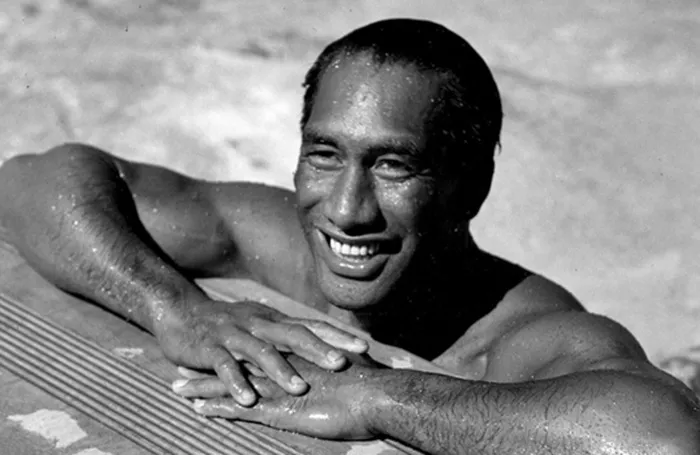Known as the “Father of Modern Surfing,” Duke Kahanamoku was far more than an Olympic gold medalist. Born in 1890 on the shores of Waikiki, Kahanamoku not only revolutionized swimming and surfing but also served as a cultural ambassador who brought Hawaiian traditions to an international audience.
A world-class swimmer and five-time Olympic medalist, Kahanamoku rose to fame in the early 20th century, captivating audiences with his athleticism, charisma, and dedication to the Hawaiian spirit of aloha.
From Waikiki Beaches to the Olympic Podium
Duke Paoa Kahinu Mokoe Hulikohola Kahanamoku was born just three years before the Hawaiian Kingdom was overthrown. Growing up in the ocean, he mastered both swimming and traditional Hawaiian surfing using massive koa wood boards, sometimes as long as 16 feet and weighing over 100 pounds.
In 1911, he stunned the sporting world by breaking the world record for the 100-yard freestyle by 4.6 seconds — a performance initially met with disbelief but ultimately recognized as a breakthrough.
Kahanamoku went on to represent the United States at the Olympic Games in 1912, 1920, and 1924. He won a total of five Olympic medals: three golds and two silvers, securing his place among the greatest swimmers of his generation. His distinctive “Kahanamoku kick” — a vigorous flutter kick — was seen as a technical innovation in competitive swimming.
At the 1924 Paris Olympics, a 34-year-old Kahanamoku took silver in the 100-meter freestyle, finishing behind his teammate Johnny Weissmuller, who would later achieve fame portraying Tarzan in Hollywood.
Despite the competitive spirit, Kahanamoku remained humble. Before the race, he famously told Weissmuller, “The most important thing in this race is to get the American flag up there three times.” Their team accomplished that, with Duke’s brother Samuel claiming bronze.
Spreading the Spirit of Surfing Worldwide
Though Kahanamoku’s Olympic achievements were historic, his most enduring legacy came through surfing. For Kahanamoku, surfing was more than a sport — it was an expression of Hawaiian identity and harmony with nature.
Beginning in the 1910s, Kahanamoku toured internationally to demonstrate the art of surfing. His legendary 1914 exhibition at Freshwater Beach in Sydney, Australia, is widely regarded as the birthplace of modern Australian surfing. Using a handmade board carved from local timber, he invited onlookers to try it for themselves, igniting a lasting passion for the sport.
He also helped foster California’s surfing culture and lobbied for decades to include the sport in the Olympic Games — a dream realized posthumously in the 2020 Tokyo Olympics.
Kahanamoku’s dedication to surfing was matched by moments of real-life heroism. In 1925, he rescued eight men from a capsized fishing vessel off Laguna Beach, using his surfboard to paddle each to safety. Though five lives were lost, 13 were saved, largely due to his leadership and skill in the water.
A Life of Public Service and Global Recognition
Beyond sports, Kahanamoku embraced roles in public life and entertainment. In Hollywood, he appeared in more than a dozen films, typically in roles emphasizing his Polynesian heritage and athletic build.
Later, Kahanamoku returned to Honolulu, where he served as sheriff from 1932 to 1961, winning 13 consecutive elections. In this role, he became a welcoming face of Hawaii to dignitaries and visitors, earning him the informal title of Hawaii’s “ambassador to the world.”
One such visit occurred in 1934, when he greeted President Franklin D. Roosevelt’s sons at Waikiki Beach during the first presidential trip to the territory.
Throughout his life, Kahanamoku’s deep commitment to Hawaiian traditions and inclusive spirit left an indelible mark on those he met. His influence extended beyond borders, transcending racial and cultural divides in a time of increasing global tension.
Legacy of a Legend
Duke Kahanamoku died on January 22, 1968, at the age of 77. He was posthumously inducted into both the International Swimming Hall of Fame and the International Surfing Hall of Fame.
Today, statues, surf competitions, and educational programs continue to honor his memory across Hawaii and around the world.
More than a champion athlete, Kahanamoku was a cultural pioneer and a beacon of the aloha spirit. Through his Olympic triumphs, oceanic mastery, and warm-hearted diplomacy, he helped the world see Hawaii not just as a place — but as a way of life.


